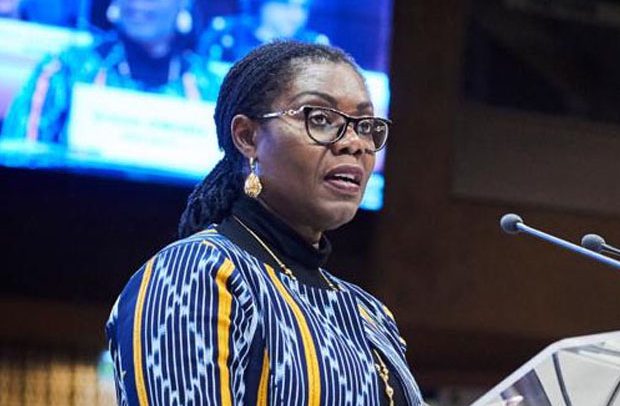Ursula Owusu-Ekuful
The Minister of Communications and Digitalisation, Ursula Owusu-Ekuful, said Ghana achieved full migration from analogue to Digital Terrestrial Television (DTT) ahead of the international deadline of December 2020.
According to her, what is outstanding is the analogue switch off phase which will be done when sufficient set top boxes have been procured, adding that “barring the supply chain difficulties imposed by the COVID-19 pandemic, STBs hope to be received in the country by the end of the year.”
“The International Telecommunication Union (ITU) granted African countries an extension of the deadline from 2015 to 2020,” the minister explained.
Answering questions in Parliament, she indicated that Ghana, through the Ministry of Communications and Digitalisation (MoCD), commenced the migration from analogue terrestrial television to Digital Terrestrial Television Broadcasting in 2015.
“In 2019, the Headend at Kanda and all 42 transmission sites nationwide were integrated fully to provide Digital Terrestrial Television signals for population coverage of 90%,” Mrs. Owusu-Ekuful said.
She revealed that the ministry was in the process of providing green solar power to all the sites to reduce the operational expenses, and added that once completed, it would reduce power costs by 80%.
“All licensed free to air broadcasters are currently transmitting digitally from the National DTT network. The 10% of the population who cannot be reached by the terrestrial network due to their location are receiving digital television broadcasting through the satellite in-built service in the network Direct-to-Home (DTH),” she added.
Meanwhile, Mrs. Owusu-Ekuful has stated that the Ministry of Communications and Digitalisation, through the Ghana Investment Fund for Electronic Communications (GIFEC), launched the Rural Telephony Project (RTP) in partnership with Huawei in November 2020 to construct 2,016 cell sites in various communities across the country.
“The novel Rural Star Technology being used, which was developed in Ghana by Huawei in 2018, is a cost-effective solar powered solution which will save Government up to 70% of the cost of traditional cell sites and provide voice and data services for over 3.4million people in unserved and underserved communities to accelerate economic development,” she stressed.
She asserted that all sites on the RTP network would also be connected to the national roaming project and provide shared infrastructure for all mobile network operators to provide their services to consumers.
“Mr. Speaker, a total of 1,000 communities have been earmarked to benefit from the Rural Telephony project in the year 2021,” she stated.
Ernest Kofi Adu, Parliament House

